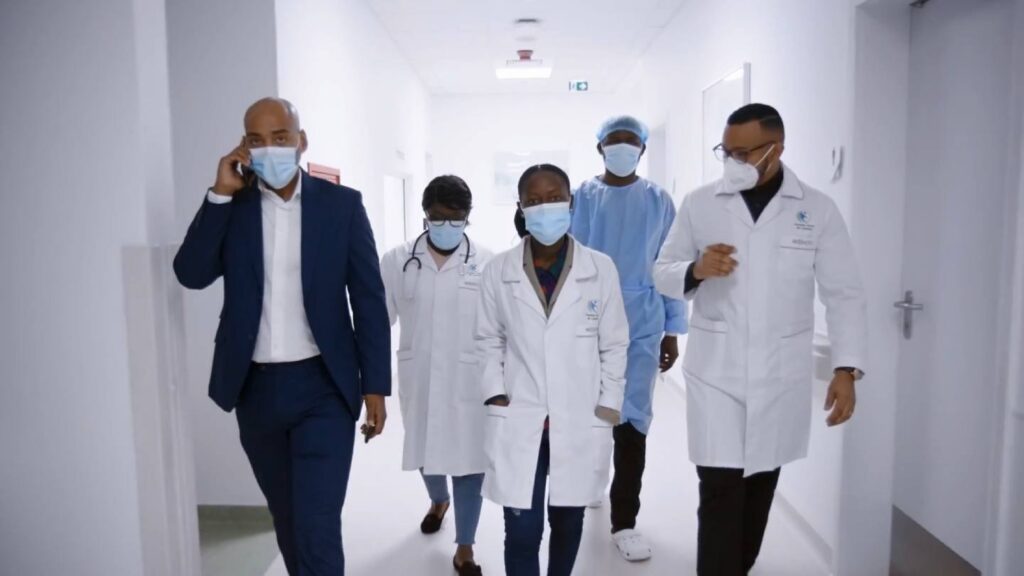- How Angola’s Healthcare System Works
- Public Health Insurance in Angola
- Private Health Insurance in Angola
- Health Insurance Options for Expats in Angola
- Comparing Public and Private Insurance Options in Angola
- Key Things to Consider Before Choosing a Health Insurance Plan in Angola
- The Future of Health Insurance in Angola
- Conclusion: Making Informed Decisions About Health Insurance in Angola
- Frequently Asked Questions
Angola’s healthcare landscape combines a public system managed by the government and a growing private sector that serves urban and expatriate populations. Understanding health insurance in Angola is essential for accessing the right care and managing medical costs effectively.
For locals, health insurance options impact access to basic and emergency services. Expats face additional challenges such as language barriers and the need for international coverage. Both groups benefit from knowing how Angola’s healthcare system works.
This article will explain the public and private insurance options, compare their benefits, and offer practical advice for making informed health insurance decisions in Angola.
How Angola’s Healthcare System Works
Understanding Angola’s healthcare system is essential for residents and visitors who need access to medical care. Angola operates a dual healthcare system that combines public services managed by the government and a growing private sector.
This structure aims to provide a range of medical options, though access and quality can vary widely depending on location and resources.
The Dual Healthcare System: Public and Private
Angola’s healthcare system is divided into two main parts: public and private care. The public system, overseen by the Ministry of Health, provides basic and emergency medical services to the population at low or no cost. It covers primary care through local health posts, secondary care at provincial hospitals, and tertiary care at specialized central hospitals.
On the other hand, the private sector offers more specialized services, often with shorter wait times and better facilities. Private healthcare mainly serves middle- and upper-income individuals, as well as expatriates working in Angola’s urban centers.
Many private providers focus on outpatient specialist consultations, diagnostic testing, and elective procedures.
Who Manages Angola’s Healthcare System
The Ministry of Health is the central authority responsible for regulating and managing the country’s public health system. It establishes policies, oversees funding distribution, and coordinates nationwide health programs.
Additionally, the ministry works with regional health departments to deliver services across Angola’s provinces.
Private healthcare providers operate independently but must comply with government regulations. These providers often collaborate with multinational insurance companies to offer coverage tailored to expats and corporate clients.
Urban and Rural Healthcare Disparities
Healthcare access in Angola varies significantly between urban and rural areas. Urban centers such as Luanda have better-equipped hospitals and clinics with more healthcare professionals and modern equipment. Patients in cities generally have easier access to both public and private healthcare services.
Conversely, rural areas face several challenges, including limited medical facilities, shortages of trained staff, and insufficient medical supplies.
Residents in remote regions often rely on basic health posts that provide primary care but lack advanced treatment options. These disparities contribute to ongoing health inequalities within the country.
Public Health Insurance in Angola
Public health insurance in Angola provides essential medical coverage for the majority of the population. It is designed to offer affordable access to healthcare services through the government-run system. Citizens and legal residents can receive care under this program, which focuses on basic health needs and emergency treatment.
Who Is Covered Under Public Health Insurance
Public health insurance in Angola covers all Angolan citizens and registered residents. This system aims to ensure that everyone, regardless of income, has access to primary healthcare services.
However, certain specialized treatments may require referral or additional fees, especially when facilities are limited.
Types of Care Provided
The public health insurance structure organizes care into three main levels:
- Primary Care: Delivered at local health posts and municipal clinics, primary care addresses common illnesses, maternal and child health, vaccinations, and basic preventive services.
- Secondary Care: Provided at provincial hospitals, secondary care includes more advanced diagnostics, inpatient services, and treatment for moderate health conditions.
- Tertiary Care: Offered by central and specialized hospitals, tertiary care focuses on complex medical procedures, surgeries, and treatments requiring expert specialists.
Advantages of Public Health Insurance
One significant advantage of public health insurance in Angola is its low cost or, in many cases, free access. This makes healthcare more affordable for low-income families and supports widespread availability, especially in urban areas.
Public hospitals and clinics serve as critical healthcare points, managing large patient volumes and providing essential services.
Challenges and Limitations
Despite its benefits, public health insurance in Angola faces several challenges. Access to healthcare remains limited in many rural regions where facilities and trained personnel are scarce.
Patients often experience long wait times due to high demand and resource constraints. Additionally, many public health centers operate with outdated equipment and insufficient medical supplies, which can affect the quality of care.
Private Health Insurance in Angola
Private health insurance in Angola serves a growing segment of the population, including middle-income Angolans, expatriates, and international workers. These plans provide access to higher-quality medical services, often with shorter wait times and more comfort than public healthcare options.
Who Uses Private Health Insurance
Many middle-income Angolans opt for private health insurance to secure faster access to specialist consultations, diagnostic tests, and hospital care.
Expatriates and employees of multinational companies also rely on private plans because these often include benefits tailored to their needs, such as emergency evacuation and coverage at international medical facilities.
Types of Services Covered
Private health insurance plans in Angola typically include:
- Specialist care, such as consultations with cardiologists, dermatologists, or other experts
- Advanced diagnostic services, including laboratory tests and medical imaging
- Hospitalization for surgeries and inpatient treatment
- Emergency evacuation, especially important for expatriates needing care abroad
However, many private plans exclude certain types of care, including routine preventive services like vaccinations or screenings, as well as ongoing management of chronic conditions such as diabetes or hypertension.
Examples of Providers
Several insurance companies operate in Angola’s private health market. Local providers offer plans designed for residents, while some international insurers focus on expatriates and corporate clients. These providers use networks of private hospitals and clinics in major cities like Luanda to deliver care.
Health Insurance Options for Expats in Angola
Expats living or working in Angola often choose private health insurance plans to ensure reliable access to quality medical care. Public healthcare services may not meet the specific needs of foreign residents, which makes private insurance the preferred option.
Why Expats Often Rely on Private Plans
Private health insurance offers expats faster access to treatment, shorter wait times, and coverage for services not always available through the public system. Many expats require medical evacuation services, especially for emergencies that local hospitals cannot manage.
Additionally, private plans often include support in English or other languages, which helps overcome communication barriers.
Coverage Essentials for Expats
When selecting expat health insurance in Angola, key coverage features include:
- Emergency evacuation to nearby countries or back home
- Access to English-speaking doctors and healthcare staff
- Coverage within a global hospital network, providing treatment options beyond Angola
- Specialist consultations, diagnostic tests, and inpatient care
- Maternity and dental coverage depending on the plan
These features help expats feel secure and maintain their health without language or logistical difficulties.
What to Look for in a Good Policy
A strong expat health insurance plan should offer comprehensive coverage tailored to the unique risks of living in Angola. Look for policies that provide:
- Transparent terms and clear claim procedures
- Wide provider networks in Angola and internationally
- Flexible coverage options for families or individuals
- Assistance services, including 24/7 helplines and multilingual support
Considering these factors will help expats avoid unexpected costs and access quality care when needed.
Comparing Local and International Providers
Local insurance companies often provide competitive rates and familiarity with Angola’s healthcare system. However, international insurers usually offer broader coverage options and global service standards.
Expats should weigh the benefits of local expertise against the flexibility and security of international plans when choosing their health insurance.
Comparing Public and Private Insurance Options in Angola
When exploring Angola health coverage options, it is important to understand the key differences between the public and private health insurance systems. Each offers distinct advantages and limitations depending on a person’s needs, location, and budget.
| Feature | Public System | Private Insurance |
|---|---|---|
| Cost | Free or subsidized | High premiums, upfront payments |
| Accessibility | Variable, limited in rural areas | Better access in cities, especially Luanda |
| Quality of Care | Basic and often inconsistent | Higher quality, shorter wait times |
| Language Support | Portuguese only | English and Spanish available in some providers |
| Coverage Scope | Basic and emergency care | Includes hospitalization, specialist visits, diagnostics |
| Suitable For | Local residents and low-income groups | Expats and urban professionals |
The public system in Angola aims to provide universal access, focusing on essential health services at little to no cost. However, resource limitations, particularly in rural regions, can affect service availability and quality.
Private health insurance offers a broader range of medical services and generally delivers faster, more personalized care. This makes private plans especially attractive for expatriates, urban professionals, and those seeking comprehensive coverage.
Understanding these Angola health coverage options helps individuals make informed decisions based on their healthcare priorities, financial situation, and geographic location.
Key Things to Consider Before Choosing a Health Insurance Plan in Angola
Selecting the right health insurance plan in Angola requires careful consideration of several important factors. Whether you are exploring Angola medical insurance for yourself or your family, understanding the trade-offs and available options can help you make an informed decision that suits your needs.
Cost Versus Quality Trade-Off
One of the main decisions involves balancing cost and quality. Public health insurance often comes with little or no direct cost but may offer limited services and longer wait times.
Private insurance, while more expensive, typically provides faster access to specialists, better facilities, and a broader range of treatments. Assess your healthcare priorities and budget to determine which option aligns best with your expectations.
Employer-Provided Insurance Options
Many employers in Angola offer health insurance as part of their employee benefits package. These plans often provide convenient access to private healthcare services at reduced costs or fully covered premiums.
If you are employed by a multinational or large local company, inquire about available insurance options before purchasing a separate policy.
Family Versus Individual Coverage
Consider whether you need coverage only for yourself or for your entire family. Family plans generally offer better value and protect dependents, including children and spouses. Be sure to review what services are included for each family member and whether maternity or pediatric care is covered.
Access to Emergency Care and International Hospitals
For expats and frequent travelers, access to emergency medical evacuation and treatment in international hospitals is critical. Some Angola medical insurance policies include evacuation services and partnerships with global healthcare providers.
Confirm these details in your policy, especially if you live outside major cities or have specific health risks.
Language and Cultural Barriers
Language differences can affect the quality of healthcare received. While public hospitals primarily operate in Portuguese, some private providers offer services in English or Spanish to accommodate expatriates.
When choosing a plan, consider whether language support and cultural understanding are part of the provider’s services to ensure effective communication during medical care.
The Future of Health Insurance in Angola
Angola is actively working towards achieving universal health coverage (UHC) by 2025. This ambitious goal aims to provide equitable access to essential health services for all residents, regardless of income or location.
To realize this vision, the government is implementing a multifaceted strategy that includes public-private partnerships, digital health innovations, and capacity-building initiatives.
Public-Private Partnerships and Reforms
Recognizing the need for collaboration, Angola is fostering public-private partnerships (PPPs) to enhance healthcare delivery. The World Bank has committed $200 million to support these initiatives, focusing on integrating private sector expertise and investment into the public health system.
These partnerships aim to improve infrastructure, expand service coverage, and increase efficiency in healthcare provision.
Digitalization and Mobile Health Tools
Digital health is becoming a cornerstone of Angola’s healthcare transformation. The Ministry of Health has introduced various digital tools to improve service delivery, especially in remote areas.
For instance, the Safe Delivery App, launched in partnership with the United Nations Population Fund, equips health professionals with essential resources for safe childbirth practices.
Additionally, mobile health platforms like eMobile are being utilized for disease surveillance and data collection, enhancing the responsiveness of the healthcare system.
Trusted Sources for Updates
To stay informed about developments in Angola’s health insurance landscape, consider following these trusted sources:
- Ministry of Health (MINSA): The official government body overseeing health policies and initiatives.
- World Health Organization (WHO) – Angola Office: Provides updates on health programs and statistics.
- Local Insurance Providers: Companies like ENSA Seguros de Angola offer insights into the private health insurance market.
By monitoring these sources, residents and expatriates can stay abreast of changes and opportunities in Angola’s evolving healthcare system.
Conclusion: Making Informed Decisions About Health Insurance in Angola
Choosing the right health insurance plan in Angola depends on your individual circumstances and healthcare needs. The public system provides accessible, low-cost care suitable for local residents and those with limited budgets.
In contrast, private health insurance offers broader coverage, faster service, and access to specialized treatments, making it a better option for expatriates, urban professionals, and those seeking higher-quality care.
For expats planning to live or work in Angola, it is crucial to carefully review the details of any health insurance policy before arriving. Understanding coverage limits, exclusions, and provider networks will help avoid unexpected costs and ensure timely access to medical care.
Planning to move to Angola? Compare insurance providers now for peace of mind and secure the health coverage that fits your needs best.
Frequently Asked Questions
Is health insurance mandatory in Angola?
Health insurance is not mandatory in Angola. While public healthcare is available to all citizens at little or no cost, individuals may choose to purchase private insurance for additional coverage and faster access to specialized services.
Can expats access public healthcare in Angola?
Yes, expats can access public healthcare services in Angola. However, the quality and availability of public healthcare may vary, especially outside major cities. Many expats prefer private insurance for more comprehensive care and language support.
What is the cost of private health insurance in Angola?
The cost of private health insurance in Angola varies depending on coverage level, age, and provider. Generally, private plans involve higher premiums and upfront payments but offer better access to specialists and private facilities.
Which private health insurers operate in Angola?
Several private health insurers serve the Angolan market, including local companies and international providers. Common options include ENSA Seguros and other regional insurers that work with private hospitals and clinics, especially in urban areas like Luanda.
Does Angola offer universal healthcare?
Angola aims to achieve universal health coverage by 2025 through reforms and expansion of public health services. The goal is to ensure that all residents have access to essential healthcare regardless of their location or income.



